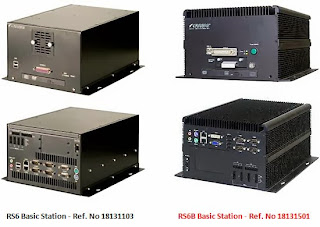Captains whose yachts are fitted with ECDIS units supplied by Transas are being advised to check the age and model type of navigation computers following the overheating and failure of some hardware fitted aboard yachts
The failures have all been hardware related problems. Of significance is that all the computers were of the older RS6 type, of between 2-4 years old depending when they were supplied to the shipyards and also how long they had been in storage.
In more recent times, ECDIS units supplied by Transas have the newer RS6B, which, is understood to be far more reliable.
Transas, have said that older RS6 PCs have fans, that need to be cleaned after a while to help with air flow. The new RS6B computers do not have fans, have solid state hard drives and employ less moving parts. This results in newer units being more reliable and less prone to overheating failures because they are designed to disperse heat in different ways.
Adrian McCourt the Managing Director of super yacht managers Watkins Superyachts advises “I am currently checking ECDIS units on board the entire fleet to see if they are the older RS6 type computer. If so, they could fail at any time, placing the yacht in a difficult position.”
“We are preparing contingency plans in case of ECDIS failure and have contacted the provider to replace older RS6 type for the newer RS6B type computers with Navisailor 4000 Transas.”


Hi,
My name is Christopher and I work in Transas. We have investigated the above described issue and I want to contribute the following:
Since 1997 Transas has been using computers and other hardware designed for ECDIS/ECS that is certified according to the IEC60945 requirements. This means that our components are designed and tested to operate in an environment with a surrounding temperature from -15oC to +55oC.
From 2011 we use the latest generation of Marine Computers RS6B and RS7, which are both fan-less and equipped with Solid State Drive. This means no moving parts and minimum maintenance is required. More than 3,000 units of those models are installed to date where our well-respected manufacturers meet our high internal quality target of less than 1% field claims.
The previous models of Transas Marine Computers RS1-RS6 were designed and constructed to the state-of-art technology of that time. In these systems, Transas used industrial PC components such as fans and hard disk used for data storage. These computers require regular maintenance like filter cleaning. Filters are installed to protect the electronics from dust and pollution. Over the years we have supplied almost 10,000 units.
During the past 15 years we have from time to time faced problems with overheating due to the fact that computers have been mounted in consoles or compartments where ventilation was missing or there was not enough air circulation to keep the surrounding temperature below +55oC. In all cases (less than 0,6% of all installed maritime computers) where Transas service department has been involved the problem was solved at a customer satisfaction.
The article mentions Watkins Superyachts. Transas is happy to closely cooperate with its customers to resolve any issues related to a proper and safe use of the equipment supplied. Today we do not have any service cases with this customer.
Transas, being the first company to gain ECDIS type-approval in 1999, has equipped more than 6,500 ships with certified ECDIS and another 8,000 ships with ECS systems. We are confident that our products designed by mariners for mariners for the rough and demanding sea conditions are among the most reliable systems on the market and market recognition is a proof of that.
If you have any questions, please feel free to contact me. megayacht@transas.com